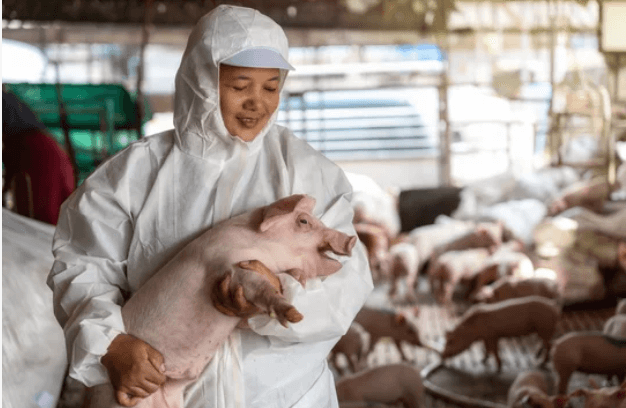Safeguarding Global Food Sources
Innovating to protect protein sources
Food security is pivotal to global health
Animal diseases exacerbate food insecurity, hunger, and farming operations. Our health and livelihood depends on healthy animals.
We seek solutions for diseases that threaten vital protein sources around the world.
A streamlined approach
Our platform employs unique approaches to accelerate drug development and further prevent spread of diseases.
Combinatorial Strategy
We combine CRISPR systems to directly target the site of replication or cellular mechanisms.
Multiplex Approach
We multiplex highly-specific CRISPR guides to target conserved locations within pathogenic genomes.
Translational Biology
Our target ablation platform limits disease progression, enabling the host organism to mount protective responses to better fight disease.
Our platform demonstrates efficacy in tackling viral diseases in animals
Use Case
African Swine Fever Virus (ASFV)
ASFV Trial Results
Targeted ASFV Treatment
Seek Labs has developed CRISPR-based technology to limit ASFV replication.
Seek Labs' CRISPR technology extended survival of ASFV-infected pigs
“I have worked on developing vaccine candidates for African Swine Fever for over 15 years. With no available treatments for African Swine Fever, this is a breakthrough discovery. These are excellent results that indicate the potential to dramatically increase survivability in pigs against ASFV infection and treat other animal diseases.” - Dr. Doug Gladue, PhD, internationally recognized leader in ASFV research and vaccine development
36%
of the world relies on pork as a primary protein source
$196.2B
lost in revenue between 2019 and 2022 because of ASF
40%
OF PIGS ON EARTH DIED BETWEEN 2019 AND 2022 AS A RESULT OF ASFV SPREAD
African Swine Fever Virus is a major threat to food security worldwide. While ASFV is not a risk to human health, the disease poses a significant threat to the global swine industry, encompassing domesticated pigs, feral pigs, and boars. To date, no effective vaccine or treatment is available for ASFV.

ASFV is a virulent disease with a mortality rate up to 100% and is classified by the World Organization for Animal Health as a List A disease. The virus afflicts domestic and wild swine, primarily in regions of Asia, Europe, Africa, and the Americas.
ASFV is a highly infectious, easily transmitted, rapidly mutating virus. With a very high reproduction number (R0 = 18; a mathematical score indicating the number of infections directly generated by one infected subject), ASFV can survive for prolonged periods on clothes, boots, wheels, and other materials.
A Global Food Crisis
It is estimated 40% of all swine on earth were decimated between 2019 and 2022 as a result of an ASFV outbreak.


